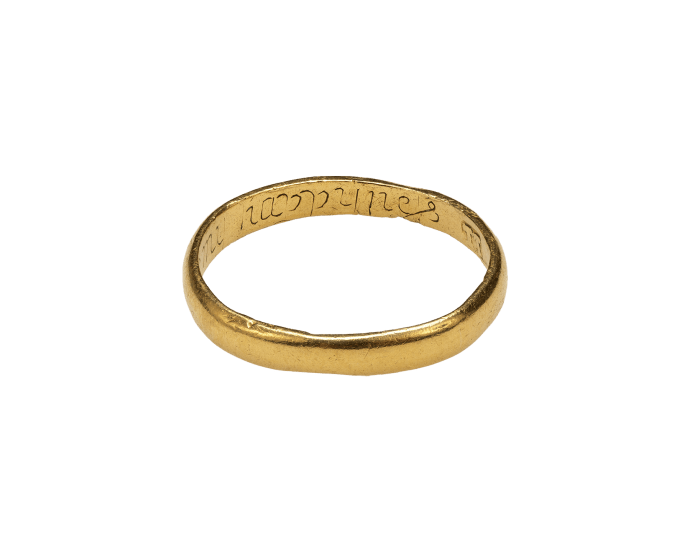







Description
Delightful posy wishing happiness from the giver to the recipient
Gold band with D-section, plain on the exterior and on the interior engraved with the inscription in italic script: “Heaven is my happynes.” Slightly off-round shape due to age and wear. The ring is in good wearable condition. The rectangular punch with maker’s mark inside the hoop shows the initials ‘TT’ in capital letters. The name of the goldsmith could tentatively be that of Thomas Thorowgood, although little is known about him (see below).
Literature:
“Posy rings,” their name deriving from the term poésie or poetry, are rings with mottoes either in prose or verse. Like here, the love message was often concealed inside the hoop and its content only known to the giver and recipient. They find mention in plays by William Shakespeare, such as Hamlet and the Merchant of Venice, and throughout the seventeenth and eighteenth centuries posy rings enjoyed great popularity. These were traditionally exchanged between friends, family, and lovers, or given as betrothal or wedding rings.
The same motto appears on a ring in the British Museum, London (1961,1202.211), formerly from the Sir John Evans Collection and donated by Dame Joan Evans, the author of the compendium on English Posies, in which the ring is quoted (Evans, 1931, p. 47). The maker’s mark on the ring is also ‘TT’ and is thought to be that of Thomas Thorowgood. He registered his maker’s marks at the Goldsmiths’ Company, London in 1634. Two further rings in the British Museum bear the same maker’s mark (1961,1202.95 and Dalton 1912, no. 1274). The same one also appears on a ring in the Museum of London (62.4/116).
“Heaven is my happiness” refers to eternal happiness in the presence of God; for the original owner of the ring the posy perhaps to a future life in love and the ring may have been a betrothal or wedding ring.
For a history of posy rings with extensive examples ranging from the medieval period to eighteenth century, see: Scarisbrick 2021 and further information on posies: Evans, 1931; Anon., A Garland of Love: A Collection of Posy-Ring Mottoes, London 1907; Dalton 1912, pp. 174 ff.; Scarisbrick 2007, pp. 74 ff.; Taylor and Scarisbrick 1978; Oman 1974, pp. 39 ff.